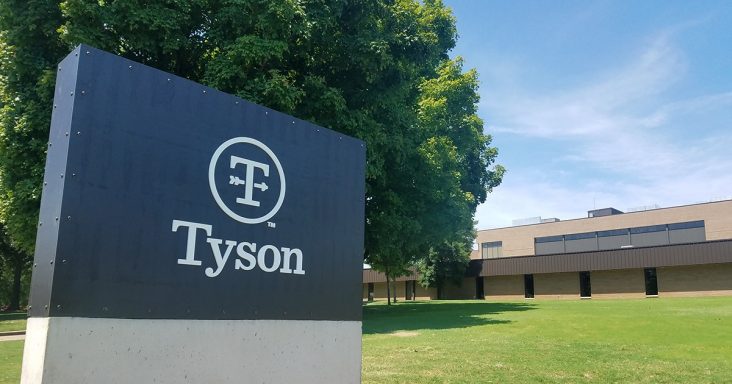Tyson execs discuss a year of challenges, plant closings
by February 8, 2024 3:42 pm 1,385 views

No frills, no pomp and circumstance and no protestors at the 61st annual Tyson Foods shareholder meeting held Thursday (Feb. 8) morning in Springdale. Board Chair John H. Tyson spoke briefly about the company’s complexities and challenges.
He said the new year began with some positive momentum, with the recent better-than-expected first-quarter earnings.
“I can tell you the leadership team is focused, collaborative and efficient, and I am looking forward to celebrating Tyson Foods’ 90th anniversary in 2025. We are moving in the right direction, and we are fundamentally strong and as prepared for the future as we have been in a while,” Tyson said.
Also speaking at the meeting was Chief Financial Officer John Randal Tyson, son of Chairman Tyson and great-grandson of the company founder. He said fiscal 2023 was a challenging year for Tyson Foods.
“We took strategic actions to improve our performance … we saw the benefits of these actions with the beginning of this year producing improving results. While uncertainties remain, we believe the company is on an upward trajectory,” John R. Tyson said.
He said a key focus item for us this year is driving cash flow by controlling how the company deploys capital. In the past quarter, he said Tyson generated an operating cash flow of $1.3 billion. He said the priorities for allocating capital center around growing the branded food business and returns to shareholders while also building financial strength and maintaining the company’s investment-grade credit rating.

Tyson Foods paid $670 million to shareholders in dividends in 2023. To start 2024, the company paid $171 million in first-quarter dividends following an increase by the board of directors. For 2024, Tyson said it will pay Class A shareholders $1.96 per share.
Shareholders have seen Tyson’s stock price struggle in the past year amid challenged profits in several of the company’s protein segments. One year ago, Tyson shares (NYSE: TSN) closed at $59.98. On Thursday, the shares closed at $53.78, down more than $6 from a year ago.
CEO Donnie King echoed the challenges the company faced in 2023, with even the company’s core business facing headwinds. He said Tyson’s core brands are resonating with consumers with nearly 75% of consumers purchasing a Tyson product in 2023. Tyson’s core brands include Tyson, Hillshire Farms, Jimmy Dean, Ball Park, Wright Bacon, State Fair, Aidells and Smart Chicken.
He said the company took bold actions in 2023 by closing eight production plants. Closing plants is never easy, but King said it was the right decision for the business and shareholders. He said improvements in live operations in chicken reduced costs and improved the yield resulting in better segment performance in the recent quarter.
The plant closures resulted in an estimated 4,500 job losses, with plant closings including around 1,000 job losses in Van Buren, Ark., and around 200 jobs lost with a plant closing in North Little Rock.
BUSINESS MEETING
The senior Tyson conducted the business portion of the meeting where shareholders’ votes were revealed for the items outlined in the company’s annual proxy filing with the regulators in December.
Tyson Foods maintains a dual class of shareholders with Class A shares traded and listed on the New York Stock Exchange. The Class B shares are restricted stock and owned by the Tyson Family. The Class B shares carry a 10:1 voting advantage over the Class A shares and give the Tyson Family control of shareholder voting.
A slate of directors was elected to a one-year term. The directors are John H. Tyson, chairman, Les Baledge, former Arkansas Gov. Mike Beebe, Maria Borras, David Bronczek, Mikel Durhan, Donnie King, Jonathan Mariner, Kevin McNamara, Cheryl Miller, Jeffrey Schomburger, Barbara Tyson, Noel White and Kate Quinn.
There were four separate shareholder proposals read at the meeting. The first was shareholders asking for the company to provide a lobbying report annually that aligns with the company’s science-based targets and zero-imitation ambitions. Tyson shareholders voted against this proposal.
Another proposal asked Tyson Foods to submit to a third-party audit to assess the company’s practices and policies in preventing child labor in its operations and those of its vendors. Tyson shareholders voted against this proposal.
“Too many workers have suffered injuries or serious health problems under Tyson’s watch and these shareholders have had enough of exploitation in their name. Workers deserve dignity, fair pay and transparency. I hope more investors will stand with workers and demand an end to the dangerous conditions that people endure throughout Tyson’s supply chain, especially the exploitation of vulnerable children,” said Magaly Licolli, executive director at Venceremos, an organization that advocates for Tyson workers and other poultry workers in Arkansas.
The company has said it already has practices in place concerning third-party sanitation workers and in-person audits to guarantee worker safety, health and minimum age requirements. The company also said it already reports on its lobbying efforts.
Two other shareholder proposals dealt with a greener footprint for the meat giant. Shareholders asked Tyson Foods to accelerate its efforts to eliminate deforestation from its supply chain. Another proposal asked Tyson Foods to work toward a more circular economy with regard to its packaging. Tyson said the company is already taking steps to identify and reduce risks related to deforestation and land degradation throughout its supply chain. The company also said it’s already taking steps to make product packaging more sustainable. Both of the proposals also failed to get a majority of votes.
